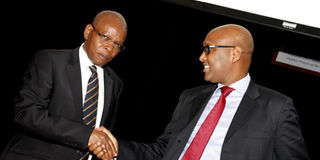TransCentury counts losses from sale of stake in Rift Valley Railways

PHOTO | DIANA NGILA Industrialisation Cabinet Secretary Adan Mohamed (right) with Vision 2030 director-general Wainaina Gituro during a trade conference on mitigating risks in regional business at the Kenya School of Monetary Studies in Nairobi on April 16, 2014. It was hosted by the Hills Institute for Regional and International Trade.
What you need to know:
- Firm to have a difficult time repaying a Sh5.1 billion convertible bond in 2016
- The investment firm disposed of its ownership at Rift Valley Railways a fortnight ago to Citadel Capital in a Sh3.8 billion deal, a move that the firm’s chief executive Gachao Kiuna said was necessitated to “maximise shareholder value”.
- In a statement to shareholders — a mandatory regulatory requirement — TransCentury has disclosed that it got the short end of the stick in the RVR sale deal, hurting its business outlook for 2014.
TransCentury Group is bleeding from losses due to the sale of its 34 per cent stake in the Kenya-Uganda rail concessionaire to an Egyptian conglomerate.
The investment firm disposed of its ownership at Rift Valley Railways a fortnight ago to Citadel Capital in a Sh3.8 billion deal, a move that the firm’s chief executive Gachao Kiuna said was necessitated to “maximise shareholder value”.
However, Wednesday the company issued a profit warning saying the deal will slash its 2014 profits by more than 25 per cent.
SHORT END OF THE STICK
In a statement to shareholders — a mandatory regulatory requirement — TransCentury has disclosed that it got the short end of the stick in the RVR sale deal, hurting its business outlook for 2014.
“The sale proceeds were below the historical fair value of the investment,” reads a highlight in the management notes accompanying the company’s financial for 2013 where it reported a 15.4 per cent drop in profit after tax.
In its 2013 financial results released on Tuesday, TransCentury did not disclose the fair value of RVR which would have estimated the expected dip in profits. In 2012, the fair value was placed at Sh3.85 billion, and might have increased by last month.
It is estimated that the 34 per cent stake would have cost Sh500 million more, which means that Sh291.2 million profit attributable to the shareholders will be entirely wiped out with a hole to fill.
“From our estimates, we see a strong likelihood that TransCentury will post a loss in 2014,” said Standard Investment Bank in a statement.
Reacting to the profit warning yesterday, investors punished TransCentury’s shares which hit an all-time low of Sh20, a 25.9 per cent drop from Sh27 previously traded.
This is a far cry from the Sh50 that the firm first traded in July 2011 after it listed on the Nairobi Securities Exchange through introduction.
The eroding performance will also have an impact on the firm’s repayment of Sh5.1 billion convertible bond in 2016, according to Mr Eric Musau, the Standard Investment Bank.
“With the current share price, bond holders are unlikely to convert,” Mr Musau told the Nation in a phone interview.
Still, despite the falling share price, TransCentury is optimistic that its power and engineering divisions will remain profitable.
In 2013, the divisions earned Sh335 million, a 17.3 per cent rise from Sh285 million they brought to the investment firm the previous year.
TransCentury posted Sh626 million in net profits last year, a 15.5 per cent drop from the Sh741 million it recorded in 2012.





